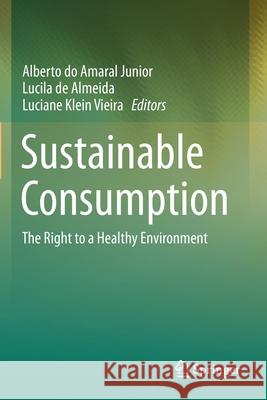Sustainable Consumption: The Right to a Healthy Environment » książka



Sustainable Consumption: The Right to a Healthy Environment
ISBN-13: 9783030169879 / Angielski / Miękka / 2020 / 500 str.
Sustainable Consumption: The Right to a Healthy Environment
ISBN-13: 9783030169879 / Angielski / Miękka / 2020 / 500 str.
(netto: 390,56 VAT: 5%)
Najniższa cena z 30 dni: 385,52
ok. 16-18 dni roboczych.
Darmowa dostawa!
"The rise of consumerism in the second half of the twentieth century brought the need to protect consumers, a phenomenon reflected in most legal traditions through predominantly private law approaches. Yet, by the end of the century, consumers had themselves become a threat due to the environmental footprint of their combined choices. Legal systems struggled to find solutions this time, largely because curtailing consumption is politically delicate. Over time, however, a wide range of techniques have been developed to bring consumption to more sustainable levels. Until now, these techniques remained scattered across different areas of law, with the resulting challenge for anyone interested in their forms and operation. This volume addresses this challenge by providing a comprehensive survey of the legal techniques developed to pursue more sustainable levels of consumption. The editors and contributors should be praised for offering such a comprehensive and timely account of this strategically important legal development".
Jorge E. Viñuales, Harold Samuel Chair of Law and Environmental Policy, University of Cambridge
"(...) This book with its broad scope that reaches beyond the core of consumer law and environmental law that engages into the political and economic dimension of sustainability, fills a huge gap in the academic literature. Those who are writing blurbs tend to use a kind of standard formula 'this is a must read for everybody working in the field'. Sustainable consumption: the right to a health environment goes beyond. The book formulates a political agenda on the law we need to realise sustainable consumption. In 1962 John F. Kennedy famously coined the formula 'consumers we are all'. The consumer rights he advocated and which form still the core of consumer policy programmes around the world, must be complemented by consumer responsibilities. There is no unlimited right to consumption at the costs of the planet. It is not by coincidence that the initiative to the current book stems from the global south. The contributions provide for a broad array of proposals of what could be done here and now and on what kind of law we need for achieving a different economy and a different society.
Hans-W. Micklitz, Professor of Economic Law, European University Institute
An Introduction to Sustainable Consumption and the Law.- Part I.- Consumer Law and Sustainable Consumption.- International and Transnational Consumer Law on Sustainable Consumption.- Sustainable Consumption and Obsolescence of Consumer Products.- The Shift from Consumer Protection to Consumer Empowerment and the Consequences for Sustainable Consumption.- Sustainable Consumption and Brazilian Consumer Behaviour.- Part II.- Traditional Legal Disciplines and Sustainable Consumption.- The Role of Sustainable Consumption and Disaster Law in Climate Risk Management.- Sustainable Public Procurement in Brazil.- The Preventive Function and Sustainable Consumption: A Creative Challenge for Attorneys.- Taking Care of Business: Engaging Dialogue on Solutions to Unsustainable Commercial Practices.- Consumer Law and Sustainability: The Work of the United Nations.- International Trade in Environmental Goods and Services and Sustainable Production and Consumption.- Part III.- Packaging and (Eco-)Labelling: Beyond the Information Paradigm.- Regulating Green Marketing Claims in the United States.- Collective Valuation of the Common Good Through Consumption: What Is (Un)Lawful in Mandatory Country-of-Origin Labelling of Non-Food Products?.- The Importance of Labelling Food Items: Information, Food Security and Sustainable Consumption.- Tobacco Packaging As a Contribution for Promotion of a Healthy Environment in Brazil.- Part IV.- Sector-Specific Approaches I: Transnational and International Law.- The International Regulation of Living Modified Organisms.- The Effects of International Agreements on Water Security: A Critical Study of the EU and MERCOSUR Approaches.- Sustainable Water Consumption, Foreign Direct Investment and the Human Right to Water.- Building Upon Sustainable Consumption and Production for Food and Apparel.- Supermarkets and Private Standards of Sustainability: The Responsibility to Protect Without Protectionism.- Part V.- Sector-Specific Approaches II: National Law.- Reasonable Credit in Canada: An Attempt to Avoid Over-Indebtedness.- Homes or iPhones? Diversion of Social Security Funds to Relieve Consumption-Fuelled Household Debt in Brazil.- Auction Design to Procure Energy Efficiency Measures as Distributed Energy Resources.- Consumer Law, Sustainable Energy Consumption and Mini- and Microgrid Decentralized Generation in Brazil.- Planned Obsolescence Resulting from Electrical and Electronic Equipment: Waste Rights and Brazil’s National Solid Waste Policy.- Potential Legal Avenues for Managing the Environmental Risks of Nanotechnology.- Looking Back to Look Forward: A Future Research Agenda for Sustainable Consumption, Law and Development.
1997-2026 DolnySlask.com Agencja Internetowa
KrainaKsiazek.PL - Księgarnia Internetowa









